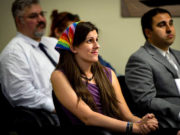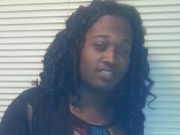Memory is a tricky thing, especially when we make major changes in life that may change how people think of us. One of the first questions my family had for me when I came out was what to do with the memories. How should I be spoken about when relating things, for the most part, but also what to do with any old photos (though there were precious few of those). And then there are the people who knew me that weren’t part of my sphere but still came into contact with various other family members. That one was easy, but then there are those in the distant past.
Something shifted in me some time in the last couple months, and I suddenly wanted to get back in touch with various school friends. People I hadn’t spoken to in twenty years or more. I’m not sure what shook loose or why I felt the need to reach out. It’s not like any of these people were a part of my life anymore, and their memories of me were no doubt long forgotten, only to be brought up on occasion. But it mattered to me and there isn’t any rational thing behind it.
“I have a habit of burning things behind me. I don’t like going back, and I often leave a phase in life wanting to be forgotten.”
I have a habit of burning things behind me. I don’t like going back, and I often leave a phase in life wanting to be forgotten. Transitioning was different. Some things I wanted to burn behind me, but others I wanted to keep. I want a past, and I’ve worked hard to not have one. I want continuity where before I only wanted the now. And there are people I cared about then that I find I still care about. I want to know how they are and that they’re doing OK in life – maybe even keep them in my life, if they’ll have me.
So I’ve started this process of finding and connecting with old friends. It’s a scary, nerve wracking process. The people I remember were generally kind, accepting, liberal folks but I’ve learned to be on my guard. I’m not welcome with some. I’m a threat to others. A potential victim at worst.
Getting in touch with some has been fairly easy with social media being what it is. Unsurprisingly, the folks I speak with are generally accepting, indifferent about my gender, and just want to know how things are; what I’ve been up to. It’s been a positive thing. Usually, the initial exchange is where we stop. A hello from some, an extended conversation from others. One picked up where we left off: sharing feelings and thoughts with the catching up about the practical things being an afterthought. Gender and transitioning came up, but only as a component to the topic. It was never a topic.

In this exchange, I realised why I wanted to do this. It is continuity, but it’s also that I want to be remembered as I am now. When those conversations happen from days gone by, I want them to know me as I am. To use my name. To maybe stumble over a pronoun or two but just crack on about that girl they knew, but didn’t know was a girl at the time. Maybe that’s too much to ask but if I didn’t make contact and become a presence, it would never happen.
We all find our own way to move on. Some sever all ties as they move from place to place, and I can say from experience that it’s an effective way to keep facing forward. Others keep a small circle or segment their lives – there’s no wrong way to move through life. Dysphoria is an isolating thing to have. As my transition settles and I am simply me, my desire to be remembered is stronger – but that’s just me.
“As I reconnect with my past, I feel more and more certain that I am not a different person.”
As I reconnect with my past, I feel more and more certain that I am not a different person. I’m the same old me, but life has happened, and I’ve moved along. A happier, more comfortable me. A me that might have problems in her past, but is OK with reaching back. I’m lucky that the people I found are open and accepting; it’s likely that if I had discovered people who were not accepting, I would not be happy with taking my past with me and the established pattern of burning all behind me would endure.
But it hasn’t. I want to rebuild and that’s surprising. I want to see where the conversation leads and actually remember a past where I went to school saying I was fine, having fun with friends but inwardly wanting to disappear forever. I want to confront that self destructive self of my past and let that young woman know that it’s OK. That it works out and the people she knew wouldn’t have hated her as she feared. That she could be herself. That I can be myself. Maybe then I can forgive myself for not being strong enough to come out; maybe I can accept that I let myself be ravaged by testosterone for another twenty years and just let it be OK. Maybe I can heal.
Enduring is a kind of strength, but it’s not enough to endure. For me to move forward, I need to reach back. If I can regain friends as I heal, so much the better. It was always my hope to regain friends.
How we take our past with us shapes us in the now. We don’t always have a choice in how we manage those things, particularly with other people. We don’t always have the cooperation of others or the mental fortitude to confront things and that’s OK. We all move forward, even if we don’t reach back.
































